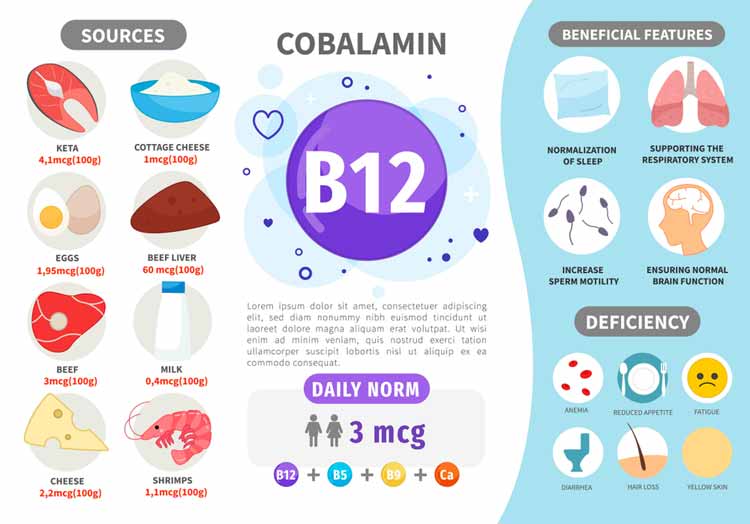B12 deficiency occurs with malabsorption or insufficient intake of the B12 vitamin. One of the most common symptoms of B12 deficiency is a tingling tongue.
Vitamin B12 or vitamin B-12 also known as cobalamin, is a water-soluble vitamin found in some foods or available in dietary supplements and prescription medication. A B12 deficiency can cause a myriad of symptoms from an itchy or tingling tongue to confusion and dementia.
Vitamin B12 and Why the Body Needs It

Vitamin B12 has several different forms and compounds although the essential ingredient is the mineral cobalt. The forms that are active in human metabolism are Methylcobalamin and 5-deoxyadenosylcobalamin.
Vitamin B12’s most significant role is in the formation of red blood cells and nerve cell maintenance. It also plays a vital role in the formation of DNA and RNA and has been seen to suppress the amino acid homocysteine, a known promoter of atherosclerosis, a thickening of artery walls due to plaque desposits, find more info.
B12 Deficiency Symptoms
A person deficient in B12 can exhibit Alzheimer-like symptoms. The most common presentation of B12 deficiency however is anemia. B12 is essential for the maintenance and formation of red blood cells. It is these red blood cells that provide the body with nutrients, energy and oxygen. They also remove the waste product carbon dioxide (CO2), from the body. Without red blood cells, a body can be starved of oxygen and face a toxic build-up of CO2.
Other symptoms of B12 deficiency include:
- anemia
- weakness
- fatigue
- tingling, sore or itchy tongue
- numbness and tingling in the hands and feet
- loss of appetite
- weight loss
- poor coordination
- confusion and forgetfulness
- depression
- dementia
Vitamin B12 Recommended Daily Intakes and At Risk Groups
Certain groups are at risk for B12 deficiency. These include:
- the elderly
- those with gastrointestinal diseases such as celiac and Crohn’s disease or who have had gastric surgery
- people with pernicious anemia
- strict vegetarians and vegans
- pregnant and lactating women who are vegetarians or vegans
All natural sources of B12 come from meat, which means that vegans and vegetarians must consider a dietary supplement of B12.
The National Institutes of Health’s Office of Dietary Supplements recommends the following daily intakes of vitamin B12:
- Birth to 6 months; 0.4 mcg 0.4 mcg
- 7-12 months; 0.5 mcg 0.5 mcg
- 1-3 years; 0.9 mcg 0.9 mcg
- 4-8 years; 1.2 mcg 1.2 mcg
- 9-13 years; 1.8 mcg 1.8 mcg
- 14+ years; 2.4 mcg 2.4 mcg 2.6 mcg 2.8 mc
Most people on a regular, balanced diet will easily receive the recommended daily allowance or RDA required. B12 can be found in fish; meat; poultry; eggs and milk products. For vegans and vegetarians, cereal products are now fortified with vitamin B12.
B12 deficiency is typically treated with intramuscular shots of vitamin B12, particularly for those people that have an absorption problem. High doses of oral B12 may be sufficient for everyone else, although injections remain the most common treatment method.
Vitamin B12 deficiency can have serious consequences unless addressed. A prolonged deficiency can cause permanent nerve damage and continued cognitive impairment. The benefits of B12 outside of its metabolic role, is that of an energy and endurance booster and preventer of heart disease. B12 can interact with some medications and vice versa, so be certain to check on medication reactions prior to adding B12 as a dietary supplement.











 Is Ostarine Legal? What is The Legal Status Of Ostarine?
Is Ostarine Legal? What is The Legal Status Of Ostarine?